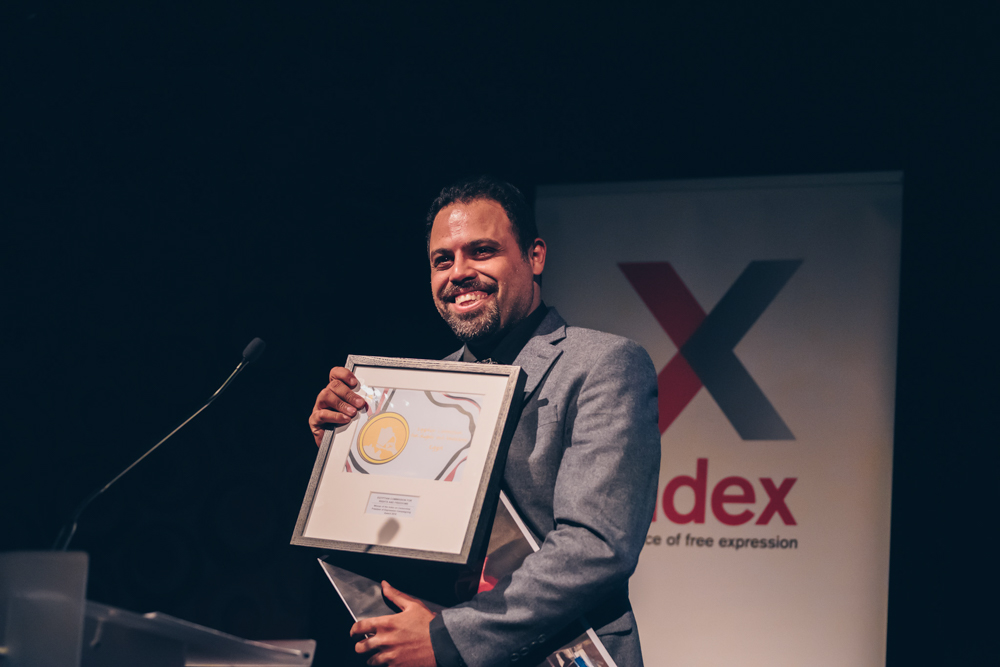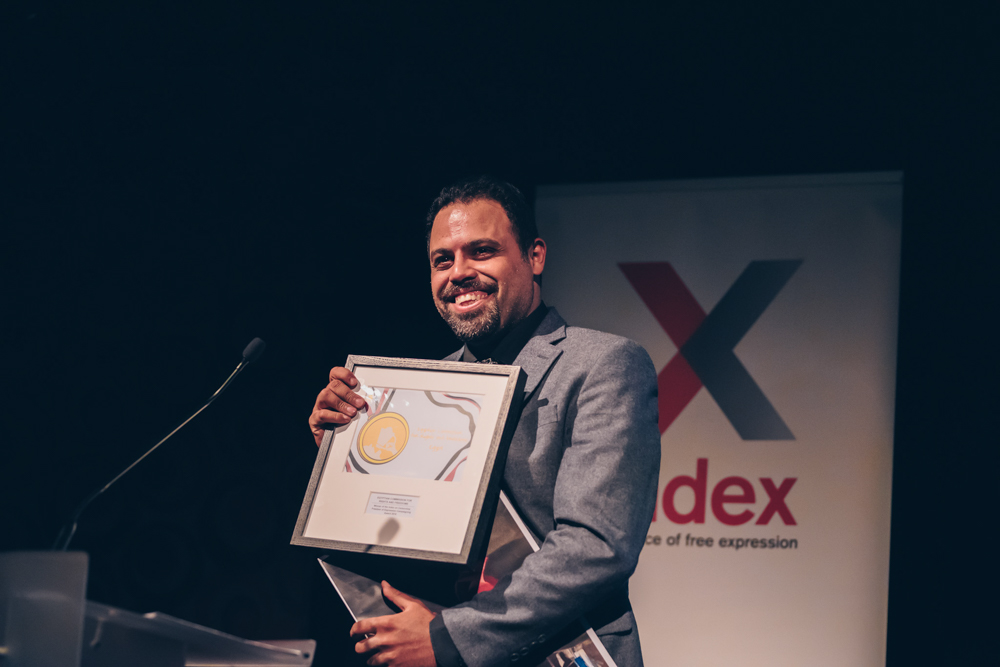[vc_row][vc_column][vc_column_text]

Ahmad Abdallah of Campaigning Award-winning Egyptian Commission for Rights and Freedoms at the 2018 Index on Censorship Freedom of Expression Awards (Photo: Elina Kansikas)
The Egyptian government has waged an organised campaign against independent civil society groups and has become increasingly hostile to dissent. The Egyptian Commission for Rights and Freedoms, winner of the 2018 Index on Censorship Freedom of Expression Award for Campaigning, is one of the few human rights organisations still operating in the country. ECRF continues to provide advocacy, legal support and campaign co-ordination, drawing attention to the many ongoing human rights abuses under the autocratic rule of Egypt’s president, Abdel Fattah el-Sisi. Their work has seen them subject to state harassment, with their headquarters being raided and staff members arrested. Regardless of the challenges and threats they face, the organisation is committed to continuing their work.
The May 2018 arrest of Amal Fathy, activist and wife of Mohamed Lotfy, executive director of ECRF, for a Facebook post she made discussing her experience with sexual harassment, has been a major challenge for the organisation. Fathy was released from prison, but a two-year prison sentence still hangs over her, which can be enforced at any time by a court. This sentence has had a significant impact on Fathy and her husband, but the fight for her freedom continues.
“She had huge depression problems when she was in jail, so she’s trying to seek some medical assistance, but still having a verdict that can be implemented any time is very bad for her,” aid Ahmad Abdallah, head of ECRF’s board of trustees.
“Everyone in ECRF believes in freedom and freedom doesn’t come without a price, so everyone is willing to pay that price,” Abdallah added. “We believe in human rights for all Egyptians and we know that this is very precious.”
ECRF continues to expand itself, as they now have three offices outside of Cairo and help from 13 of the 27 governorates, the top-level of public administration, in Egypt.
“Every government in Egypt has different problems than other ones,” said Abdallah. “We don’t have a centralised approach, but rather a decentralised approach and this goes with our mission and vision because we help local human rights defenders; we help them to help themselves and their communities.”
ECRF has been able to help communities in the Aswan governorate, where ECRF has helped them with keeping migrants safe and supported. In the Delta region, which has a serious issue with Gaucher disease, an inherited disorder where a type of fat called glucocerebroside cannot be adequately degraded, ECRF has provided people with legal assistance in their fight to get the government to provide them with medication.
As they expand throughout Egypt, ECRF will continue to develop its capacity to monitor human rights violations. They develop this by training all of the people who approach them wanting to learn how to document violations in their local communities. “We host a lot of training for these human rights activists to give them the technical knowledge on not just how to document violations, but also how to lobby for this, and we provide them with legal assistance whenever needed,” said Abdallah.
A report by Human Rights First looks at how the treatment of prisoners in Egypt, who are often locked up for voicing their political opinions, has led to a drive in recruitment for the Islamic State. Abdallah, who himself was imprisoned and witnessed the radicalisation that often occurs, calls the prisons “terrorist-making machines”. “A lot of the time prisoners are forced to join Isis to take some benefits because they are the most organised body inside prison and a lot of the prisoners, they have nothing, so sometimes people in Isis provide them with food, and provide them with protection in prison,” he said.
ECRF has made their main priority in 2019 to challenge the death penalty, which has already been enforced at least 15 times since the start of the year, with around 50 people at risk of execution at any moment.
“With any other charge, people can have another chance for life, but with execution it’s already over,” said Abdallah. “So this year we are planning to lobby more against the capital punishment in Egypt and we hope that this will be successful,”
For ECRF, being an Index fellow has given them much recognition, which has been hugely important in opening the door to work with other big organisations such as Ushahidi, a technology company they are planning on working with, Abdallah added. “Being an Index fellow has put us on the map as a big organisation that has won such a respected prize. Mostly it helped us to crystallise our vision, and this is the biggest success that we have achieved.”[/vc_column_text][/vc_column][/vc_row][vc_row][vc_column][vc_basic_grid post_type=”post” max_items=”4″ element_width=”6″ grid_id=”vc_gid:1554194959898-530a4dcb-1737-5″ taxonomies=”24136, 25926″][/vc_column][/vc_row]





